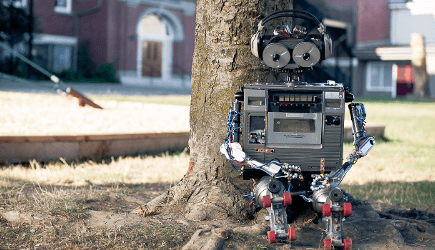Robot Gets New Routines to Escape Bullying Children
August 11, 2015
on
on

Amidst all the talk about the dangers robots can pose to humanity, two Japanese research groups examined the opposite eventuality of interspecies violence: people abusing robots.
Unsurprisingly, a couple of days at a shopping mall gave them more practical material to work with than the theoretical ponderings of robot-fearing folk. Barring science fiction, the first instance of robot on human intentional violence has yet to be recorded, whereas thousands of years of human history firmly establishes our species' propensity for hostility, especially against those it considers Other.
The research group observed the daily motions of Robovie II, a robot displaying human-like behavior. As it wheeled around an Osaka shopping mall it was met with abuse on quite a few occasions. Its assailants were humans in their most uncivilized form: children.
The kids bullied Robovie II in a number of ways. They encircled it to prevent it from leaving, called it names and covered its visual sensors. Some devolved into physical abuse including, kicking, beating and bending the bots' joints.
Some of the children were interviewed afterwards. In the paper Why Do Children Abuse Robots, the team of researchers from Ryukoku University, ATR Intelligent Robotics and Communications Laboratories and Tokai University recount the childrens' motivations. Of a total of 28 kids 35% said they bullied the robot for enjoyment, 22% named curiosity as their incentive and 17% claimed they followed the lead of others. One kid explicitly said it wanted to threaten the robot.
Another team of researchers, all affiliated with ATR Laboratories, used data from the same experiment to empower the robot to avoid bullying. They noted the kids were more prone to bullying when they weren't supervised by adults and when they moved in packs. The team developed an algorithm that instructs Robovie II to steer clear of humans measuring 1.40 meters (4.6 feet) in hight or less, especially when it spots a group of them. Its defense strategy is to move in the direction of taller humans, a.k.a. adults who – it is hoped – will engage in the ongoing process of civilizing their shorter counterparts by teaching them to respect their fellow earth dweller.
The findings were presented in the paper Escaping from Children's Abuse of Social Robots [paywalled].
Image: Edgar Allen Poe-Bot by Jason Hargrove. CC BY-NC-ND 2.0 license.
Unsurprisingly, a couple of days at a shopping mall gave them more practical material to work with than the theoretical ponderings of robot-fearing folk. Barring science fiction, the first instance of robot on human intentional violence has yet to be recorded, whereas thousands of years of human history firmly establishes our species' propensity for hostility, especially against those it considers Other.
The research group observed the daily motions of Robovie II, a robot displaying human-like behavior. As it wheeled around an Osaka shopping mall it was met with abuse on quite a few occasions. Its assailants were humans in their most uncivilized form: children.
The kids bullied Robovie II in a number of ways. They encircled it to prevent it from leaving, called it names and covered its visual sensors. Some devolved into physical abuse including, kicking, beating and bending the bots' joints.
Some of the children were interviewed afterwards. In the paper Why Do Children Abuse Robots, the team of researchers from Ryukoku University, ATR Intelligent Robotics and Communications Laboratories and Tokai University recount the childrens' motivations. Of a total of 28 kids 35% said they bullied the robot for enjoyment, 22% named curiosity as their incentive and 17% claimed they followed the lead of others. One kid explicitly said it wanted to threaten the robot.
Another team of researchers, all affiliated with ATR Laboratories, used data from the same experiment to empower the robot to avoid bullying. They noted the kids were more prone to bullying when they weren't supervised by adults and when they moved in packs. The team developed an algorithm that instructs Robovie II to steer clear of humans measuring 1.40 meters (4.6 feet) in hight or less, especially when it spots a group of them. Its defense strategy is to move in the direction of taller humans, a.k.a. adults who – it is hoped – will engage in the ongoing process of civilizing their shorter counterparts by teaching them to respect their fellow earth dweller.
The findings were presented in the paper Escaping from Children's Abuse of Social Robots [paywalled].
Image: Edgar Allen Poe-Bot by Jason Hargrove. CC BY-NC-ND 2.0 license.
Read full article
Hide full article


Discussion (1 comment)